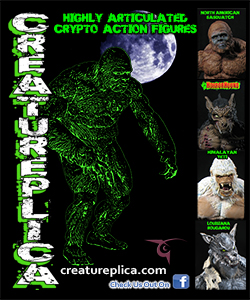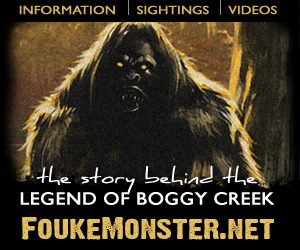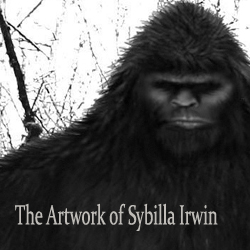Skeptic Barry Beyerstein, 60, Dies Suddenly
Posted by: Loren Coleman on July 1st, 2007

Barry Lane Beyerstein, a skeptic extraordinairé, was born on May 19, 1947, in Edmonton, Alberta, Canada. In recent years, he called Moody Lake, British Columbia, his home.
On Monday, June 25, 2007, one day after the 60th birthday of the beginning of the era of flying saucers just across the border in Washington State, Barry L. Beyerstein, 60, was found dead at his college office desk from a heart attack.
Beyerstein, a psychology professor at Simon Frasier University, British Columbia, had become a famous media commentator on several topics from drug and alcohol addiction to social beliefs linked to parapsychology, from satanists to angels.
Of interest to us, Beyerstein, as one of the leaders in the Society of B.C. Skeptics, often commented on Sasquatch, Caddy, and Ogopogo to the media.

From his detailed notes on who interviewed him on what subjects, Beyerstein listed the following:
1987, October 8 – S. Baker, Omni Magazine: Ogopogo and other legendary monsters.
1989, May 25 – A. Ross, Vancouver Province: “Cryptozoology.”
1991, March 20 – A. Mayhew, Beautiful BC Magazine: “Legendary Monsters”
1995, September 4 – “Are Ogopogo and Sasquatches real?” Interview, TV News, CHBK-TV, Kelowna, B.C., Canada.
1995, April 6 – “A skeptic’s view of the Loch Ness Monster.” Interviewed by C. Forand, Quebec Science, Montreal, P.Q., Canada.
1996, May 13 – “Sasquatches and monsters: Real or imaginary?” Interviewed by R. Crockford, The Georgia Strait, Vancouver.
1997, June 7 – “Are sasquatches imaginary?” Interview, Ross Crockford, freelance writer.
1997, June 8 – “Do sasquatches really exist?” Interview, Peter Clemente, CKVU-TV News, Vancouver, BC.
1997, June 8 – “Monsters- Myth or fact?” Interview, Paul Appleby, BBC TV, Bristol, UK.
1998, July 17 – J. Lippman, Sakoff Productions, Los Angeles, The Entertainment Network, “Are sea monsters real?”
2004, October 26 – K. Adams, CTV-BC Network. “Ogopogo sightings in Lake Okanagan.”
2006, May 1 – Amy Dove, Victoria News, Victoria, BC: “Cadboroughsaurus
and other mythical sea monsters.”
Also, as a SFU Instructor, Barry Beyerstein taught a course, “Social Issues.” In “Week Thirteen,” he dealt with the following subjects and readings:
Monsters and cryptozoological beasts
Bigfoot/Sasquatch
Nessie and Ogopogo
* What is cryptozoology?
* Fallacies concerning Cryptozoology.
* Successes of Cryptozoology.
* Carroll, R.T. (1998) Bigfoot . The Skeptic’s Dictionary.
* Jergens, V. (1999) Bigfoot makes lasting impression. Cincinatti Skeptic. 8(7): 1, 8-9.
* The Patterson film.
* Chorovinsky, M. (1997) Film director John Landis goes public.
* Nessie
* Ogopogo
* Moller, L. (1994) It’s a fake! The Rational Enquirer. 6(4): 1-2.
* Nickell, J. (1996) Nessie hoax redux. Skeptical Briefs. 6(1): 1-2.
Barry Beyerstein attended one of the International Sasquatch Symposiums in British Columbia. When asked specifically by a reporter about Skip Frombach’s accounts being chased down a hill by one 9-footer, Beyerstein said:
Obviously I don’t believe the story, but what the answer is would require a whole lot of digging into just who these people are. People who reject all of this often assume that witnesses are fools or frauds. They’re not necessarily either. As human beings, perceptually, cognitively, the way our memory works, we can fool ourselves — sober, intelligent, honest, well-educated people, just as easily as people who are none of the above. – Barry L. Beyerstein
Barry Beyerstein was once asked about B.C.’s famous lake monster, and told a reporter that he would love for Ogopogo to exist, but regrets the lack of visible evidence. He went on to explain that if an individual sees something strange, inexplicable, then “the mind fills in the fuzzy area, the incomplete percepts.” Beyerstein felt we can make sense out of what doesn’t make sense. The example, in this case, he gave was that a lone turbulence, snaking forward briskly, develops a head and horns and hoops, all in the mind’s eye. Nobody’s hoaxing: the brain is just doing its thing, Beyerstein thought.
Within the Skeptics community, Beyerstein was a special person, and the tributes are beginning to flow in, as for example from the CSI Executive Director, who has said, in part:
We all lost a true hero….I am stunned and saddened and I have been searching the internet for an hour this morning looking for news because I just can’t believe it. Barry Beyerstein died. Barry Beyerstein. I don’t have enough words to tell you what this loss will mean to the skeptical and rationalist world. Barry was a tireless defender of science. An activist who has been a staple in the media, television, newspapers, public forums for decades. I searched in the Skeptical Inquirer CD-ROM and found 311 mentions of his name. He is scheduled to teach a workshop for the Committee for Skeptical Inquiry in Oregon later this summer – and represent us at a conference in Ireland in the fall. He traveled and lectured all over the world for us, Australia, Belgium, England, Germany, Italy, and he was part of our delegation to China. – CSI Executive Director Barry Karr
The Vancouver Sun has published Beyerstein’s obituary, which is not online. Within it, I discovered details about Beyerstein I had not realized, about how much people felt about his gentle form of skepticism, and even that he had a son named Loren:
Well-loved psychology professor and founder of the B.C. Society for Skeptical Enquiry Barry Beyerstein will be remembered as a “kind, gentle person,” a loving father and above all, a “longstanding voice of reason.”
Beyerstein, a Port Moody resident born in Edmonton, died suddenly at the age of 60 after suffering a heart attack while working at his desk at Simon Fraser University.
The news came as a shock to his family and large circle of friends and colleagues, including his friend of 20 years, Lee Moller.
Together the two founded the B.C. Society for Skeptical Enquiry, an educational group committed to illuminating ignorance and debunking pseudoscience.
“The scientific method and the protocols of science were the backbone of his life,” said Moller.
An internationally recognized expert on human brain behavior, Beyerstein received his PhD in experimental and biological psychology from the University of California at Berkeley.
Moller recalled the many skeptical battles fought by the group, which also included Beyerstein’s brother Dale, from a campaign to get astrology columns out of The Vancouver Sun to organizing debates with creationists.
But Beyerstein was anything but aggressive or close-minded in his skepticism. “He always assumed the best, and let the facts speak for themselves,” Moller said.
Moller said Beyerstein was a “perfect skeptic” because his psychology research helped him understand why people believe what they do.
“Clearly, Barry’s work has made an important and enduring contribution to psychological science,” said Dan Weeks, chair of psychology at SFU, in a written
statement.“He achieved worldwide eminence for his critical analyses of pseudoscience in psychology and medicine. Most importantly, he was a kind and genuine person and we will miss him deeply.”
Since his death, warm words and flowers have been pouring in from people around the world who have been touched by Beyerstein’s warmth and intelligence, said his daughter Lindsay, who has set up a commemoration on her blog, majikthise.typepad.com.
Beyerstein was not only a committed academic, but a caring father to Lindsay and his son Loren, 25.
“He was a very loving and supportive dad. He was always teaching my brother and me,” Lindsay said.
The family is planning to scatter his ashes, and a larger celebration of Beyerstein’s life is being planned by the SFU psychology department in the fall.
“The number one thing he always used to tell me is if you don’t believe in an afterlife, you live on in the way that people remember you, and all you can hope for is to do your best and leave the world a little bit better than you found it,” Lindsay said. “And I think he would like to be remembered as somebody who left the world a bit better than he found it.” by Catherine Rolfsen, “Renowned SFU skeptic dies of heart attack,” Vancouver Sun, Saturday, June 30, 2007.
My sympathy and empathy to Lindsay, Loren, and his family and friends in this time of their sudden loss, and throughout their futures.
About Loren Coleman
Loren Coleman is one of the world’s leading cryptozoologists, some say “the” leading living cryptozoologist. Certainly, he is acknowledged as the current living American researcher and writer who has most popularized cryptozoology in the late 20th and early 21st centuries.
Starting his fieldwork and investigations in 1960, after traveling and trekking extensively in pursuit of cryptozoological mysteries, Coleman began writing to share his experiences in 1969. An honorary member of Ivan T. Sanderson’s Society for the Investigation of the Unexplained in the 1970s, Coleman has been bestowed with similar honorary memberships of the North Idaho College Cryptozoology Club in 1983, and in subsequent years, that of the British Columbia Scientific Cryptozoology Club, CryptoSafari International, and other international organizations. He was also a Life Member and Benefactor of the International Society of Cryptozoology (now-defunct).
Loren Coleman’s daily blog, as a member of the Cryptomundo Team, served as an ongoing avenue of communication for the ever-growing body of cryptozoo news from 2005 through 2013. He returned as an infrequent contributor beginning Halloween week of 2015.
Coleman is the founder in 2003, and current director of the International Cryptozoology Museum in Portland, Maine.










I’d like to add my condolences and best wishes for his family and friends.
I never know how to respond to news like this. It’s a rare occurence to find a skeptic in the public eye who is not blindly cynical of other people’s beliefs. This is a great loss in the search for truth.
My prayers go out to his family.
Barry was a thoughtful man and a wonderful skeptic; he and I had some great conversations, and I’ll miss him.
I was surprised/saddened when, catching up on the news after 2 weeks in the NC mountains without news/net, I learned of Barry’s death.
Barry was brilliant, and an amazing & patient teacher [I met him at the Skeptics’ Toolbox at UO] and one of the warmest humans I have ever known.
From E. Marcus Barnes, Austin, TX, long-time CFI member.
I was quite saddened to learn of Barry’s untimely death.
He, for about four years, was on the Board of Advisors of our Austin-based Institute of Neuroscience and Consciousness Studies (INACS), of which I’m a past president and presently a board member.
I was on the ‘phone with Barry just a couple of weeks ago, discussing a research project we’re getting started on. Saying he had some ideas about it he’d like to pass on, we’d planned to discuss them next month in Eugene, at the CFI Skeptics Workshop. Now I’ll never know what he had in mind.
I just feel awful…Barry will be sorely missed.
EMB
I knew Barry just a little bit, and last spoke to him just a couple weeks ago about a bogus “faith healer” we’ve both been tracking.
I was extremely sad to hear this unexpected news — Barry was a very sweet man in person, with the sort of gentle, warm-hearted, harm-reduction-oriented critical approach that skepticism should always feature at its best.
He was also a huge influence on me personally: a lecture he gave at a small sci-fi convention, way back when I was in Junior High School, was my very first introduction to skepticism. It was a small room, and a dozen or so paranormal nerds like me had the chance to bombard him with questions.
One I remember in particular was, “What about firewalking?” He said, “Well, it’s all a matter of how heat conducts. Imagine a muffin in an oven: the muffin and the oven and the muffin pan are all the same temperature, but you can safely touch the muffin if you’re quick…”
That moment was like a spotlight going on: “What, you mean some of these mysteries can be solved???” It set me on the path that eventually gave me my career and life’s work.
I had the chance to tell Barry that, a few years back, which I’m doubly grateful for now.
Such a shame. I admired him very much.
I registered here to leave a comment about Mr. Beyerstein’s untimely passing. There are few people in this world who simply can’t be replaced, and he was one of those people. If you live in Vancouver and absorb the local media, you know this. Because no matter how one-sided a news report was, if they contacted Barry for a soundbyte, at least you knew there’d be a lone voice of sanity in the piece. They’d usually give most of the time in these pieces to the ‘other side’. A classic recent example would be the pieces on local faith healer ‘Adam’ praised him six ways to sunday, but in order to appear to be ‘balanced’ reporting, they’d stick a tiny soundbyte from Barry at the end of the report. But Barry’s thinking was so well-organized that he’d be able to sum up the issue with his point of view prevailing inspite of the conflicting point of view having most of the available time, which its representatives needed to get across their confused points.
Vancouver will suffer from this loss, there’s simply no media go-to-guy around here good enough to fill his shoes. Well, except perhaps his brother Dale. Hopefully they’ll ask Dale for soundbytes now, though they always went to Barry first since he was an SFU prof, wheres Dale toils away at the local community collage. (I had the pleasure of sitting in on Dale’s Philosophy 101 class for three weeks in the early 90s before dropping out – if all my classes had been as good as his I probably wouldn’t have dropped out, either).
Although it’s been 1.5 years since Beyerstein’s death, I just learned about it yesterday.
As a Vancouver BC resident of many years, I was exposed to Beyerstein as the most visible, vocal local skeptic, who would pop up periodically in the news to denounce this or that paranormal phenomenon, belief, believer or investigator.
Frankly, I got to find him more and more tiresome the more times I had him foisted upon me via TV, radio, or newspapers!
I wondered where he’d been lately, as it seemed like a long (pleasant) while since I’d last heard him pontificate on his “fundamentalist materialist” beliefs.
Although, I’m not mean enough to wish death on anyone, and oppose the death penalty, I confess I personally am glad his voluble pseudo-skeptical voice is now silent! I call him a pseudo-skeptic, because as far as I could tell, he was anything but an open-minded skeptic.
Like most activist skeptics, his mind was made up. He had a carefully constructed world view that said paranormal phenomena is impossible. And that it was his duty (or psychological need) to spread his firm belief/ideology, and worse, persecute those who disagreed.
CSICOP/CSI, the pseudo-skeptics organization he was a proud and valued member of, has had a sordid history of persecuting brave scientists who studied subjects like ESP with an open mind, instead of with a debunker’s zeal. Particularly when study data validated claims of ESP, the CSICOP persecution machine would ramp up, and attempt to have scientists removed from University positions, demoted, fired, and denounced as “pseudo-scientists”!As Robert Anton Wilson suggests in his excellent account of the CSICOP debunker crowd, “The New Inquisition”, skeptical activists have a lot in common with the Catholic church’s Inquisition, in persecuting those who hold views deemed “heretical”! The difference being, destroying “heretics'” careers replaced burning at the stake.
Some have suggested Beyerstein was more open and fair minded a “skeptic” than some.
I see no evidence of open mindedness. The fact CSICOP/CSI embraced him as a valued member at the top of their pecking order/heap, a “hero” to the cause, speaks volumes. Because open minded skeptics soon find they are completely unwelcome at CSI, and are either driven out or leave as Marcello Truzzi, an early member, did. Truzzi then formed an organization to investigate paranormal phenomena with an OPEN mind not the closed mind of the debunking idealogue.
Truzzi, perhaps naively, at first thought CSICOP’s mission would be to impartially investigate paranormal claims with an open mind. He soon realized his CSICOP colleagues were doctrinaire fanatics, and impartiality was definitely not on CSICIOP’s agenda.
I don’t have sufficient data on this, but I’ve noticed at least a couple of the most loud and zealous debunkers didn’t live very long. Beyerstein dead at 60. Carl Sagan dead at 62. Is “skepticism” hazardous to the health?! I see the less-than-amazing Randi doesn’t fit, as he’s still going strong at 80. Are hexers are at work, “proving” to debunkers the paranormal power of black magic, by successfully hexing them (just joking!)?
Actually, instead of a silent Beyerstein, I’d have preferred to see him finally come around and accept data of some of the dozens of paranormal studies by qualified scientists conducted under University auspices over decades, many of which show statistical validity for paranormal phenomena like ESP. But unfortunately, as paranormal research scientist Rupert Sheldrake (a favourite target of CSI) says, dedicated debunkers insist on being “immune to data”.
Scientists like Beyerstein, who are immune to scientific data concerning all things paranormal,are thus approaching the subject(s) in a very UNscientic or pseudo-scientific fashion. May the real pseudo-scientist please stand up! Hello Barry Beyerstein. Goodbye.